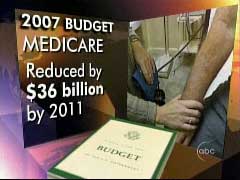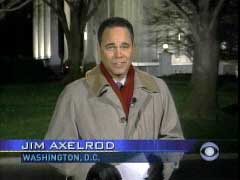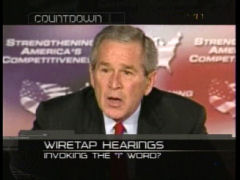|
1. Nets Cite Imaginary "Cuts" as Federal Budget Continues to Soar
Federal spending has soared 33 percent since 2001 and will continue to surge under President Bush's budget proposal released Monday afternoon, yet network reporters referred to imaginary "cuts" in programs and departments. On World News Tonight, ABC's Martha Raddatz outlined Bush's proposal to increase defense and homeland security spending before she asked: "How do pay for all this? There are no tax increases. Instead, there are a host of spending reductions. On top of the list: Slowing spending on Medicare by $36 billion through 2011." While she at least said "slowing spending," the on-screen graphic falsely stated about Medicare: "Reduced by $36 billion by 2011." She went on to recount how "the budget calls for doing away with or making substantial cuts in 141 programs for a saving of $15 billion," a minuscule amount, zeroing in on how "one-third of the cuts would target education, reducing money for the arts, parent resource centers and drug-free school programs." New CBS White House correspondent
Jim Axelrod cited "education, cut 28 percent; Housing and Urban Development, cut 30 percent" and "$36 billion in Medicare cuts over the next five years."
2. Olbermann: "Doesn't that Mean the President Should Be Impeached?"
Citing liberal Republican Senator Arlen Specter as his authority on whether President Bush's actions were "illegal," and with "Invoking the 'I' Word" on screen beneath a picture of Bush, MSNBC's Keith Olbermann opened his Monday night Countdown program: "So if the Republican Chairman of the Senate committee investigating the wiretaps says the wiretaps were illegal, and the President says he personally authorized the wiretaps, doesn't that mean the President should be impeached?" Olbermann proceeded to fondly recall, without any notion that those hearings led to impairing intelligence agencies, the Church hearings of the 1970s. Olbermann soon cued up his guest, John Dean: "Not to put too fine a point on this, but if the authorization of wiretaps without warrants is indeed illegal, as its critics say it is, has the President committed an impeachable offense?" Dean agreed: "Well he certainly has."
3. Gregory: "Overriding Sense in Press Corps" Is Bush Is "Losing"
NBC News White House reporter David Gregory thinks President Bush will have a successful presidency, citing hope in Iraq, but as for how the White House press corps sees Bush, Gregory revealed on the Chris Matthews Show that "I think the overriding sense in the press corps is that, that he's losing."
4. You Read It Here First: On FNC, Jane Hall Slaps MRC Over SOTU
You read it here first. On FNC's Fox Newswatch over the weekend, panelist Jane Hall, a former reporter for the Los Angeles Times, took a slap at the MRC over our critique of State of the Union coverage: "The Media Research Center thought there was bias in the fact that ABC mentioned that his poll numbers were so low." In fact, the February 1 CyberAlert criticized ABC for bringing up Watergate and comparing Bush to Nixon: "Anchor Elizabeth Vargas resurrected Watergate as she highlighted how Bush's 42 percent approval level 'is the worst for a President entering his sixth year in office since Watergate hammered Richard Nixon.'"
 Nets Cite Imaginary "Cuts" as Federal Nets Cite Imaginary "Cuts" as Federal
Budget Continues to Soar
 Federal spending has soared 33 percent since 2001 and will continue to surge under President Bush's budget proposal released Monday afternoon, yet network reporters referred to imaginary "cuts" in programs and departments. On World News Tonight, ABC's Martha Raddatz outlined Bush's proposal to increase defense and homeland security spending before she asked: "How do pay for all this? There are no tax increases. Instead, there are a host of spending reductions. On top of the list: Slowing spending on Medicare by $36 billion through 2011." While she at least said "slowing spending," the on-screen graphic falsely stated about Medicare: "Reduced by $36 billion by 2011." She went on to recount how "the budget calls for doing away with or making substantial cuts in 141 programs for a saving of $15 billion," a minuscule amount, zeroing in on how "one-third of the cuts would target education, reducing money for the arts, parent resource centers and drug-free school programs."
Federal spending has soared 33 percent since 2001 and will continue to surge under President Bush's budget proposal released Monday afternoon, yet network reporters referred to imaginary "cuts" in programs and departments. On World News Tonight, ABC's Martha Raddatz outlined Bush's proposal to increase defense and homeland security spending before she asked: "How do pay for all this? There are no tax increases. Instead, there are a host of spending reductions. On top of the list: Slowing spending on Medicare by $36 billion through 2011." While she at least said "slowing spending," the on-screen graphic falsely stated about Medicare: "Reduced by $36 billion by 2011." She went on to recount how "the budget calls for doing away with or making substantial cuts in 141 programs for a saving of $15 billion," a minuscule amount, zeroing in on how "one-third of the cuts would target education, reducing money for the arts, parent resource centers and drug-free school programs."
New CBS White House correspondent Jim Axelrod, like NBC's Kelly O'Donnell, at
least pointed out that the $2.77 trillion proposed budget is a "record" high. Axelrod, however, cited "education, cut 28 percent; Housing and Urban Development, cut 30 percent" and "$36 billion in Medicare cuts over the next five years." The NBC Nightly News minimized the false "cut" talk, but Kelly O'Donnell did ask: "Where are the cuts? Mr. Bush asks Congress to slice $65 billion over five years to entitlement programs."
In fact, the Heritage Foundation's Brian Reidl pointed out in a Monday report that "anti-poverty spending has surged 39% under President Bush to a record 16% of all federal spending" while "entitlement spending is projected to nearly double over the next decade." Spending on education "has soared 137 percent between 2001 and 2006." For the Heritage report, a PDF: www.heritage.org
Page 142 of the OMB's budget document projects that Medicare spending will skyrocket from $337,885 billion in 2006 to $488,917 billion in 2011, a 77 percent nominal hike in the annual level totalling $755 billion over five years -- hardly a "$36 billion cut." For the OMB's budget proposal, also a PDF: www.whitehouse.gov
As for Axelrod's 30 percent "cut" at HUD, the Washington Post reported a much smaller actual reduction: "The budget requests $33.6 billion, a decrease of nearly 2 percent (1.8%) from 2006." See: www.washingtonpost.com
The print media are no better. "Bush's $2.77 Trillion Budget Plan Calls for Medicare Cuts," an inaccurate headline declared over a New York Times article, by David Sanger, posted Monday afternoon: www.nytimes.com
Those uninitiated to the federal budget process would think spending will actually be reduced on the listed programs.
The problem with this kind of shoddy reporting -- which matches both the interests of the White House, which is trying to show fiscal responsibility, and the news media, since it can be used to paint a Republican President and Congress as heartless toward the less-fortunate -- is that it's based on adjustments to projections and not real spending levels. So, to use a simple and relatively small number, if a program is now allocated $1 million and it was expected to get a four percent increase of $40,000 to $1,000,040, but the budget proposes a three percent hike to $1,000,030, that's reported not accurately as a three percent increase (or, if inflation is running at 3.5 percent, half a percent below inflation), but ridiculously as a "25 percent cut" (4 percent to 3 percent.)
How else to explain the ludicrous Washington Post table, posted Monday afternoon, which claims a negative 63 "percent change" in spending for the Department of Energy. But don't expect half the employees to be laid off. Another graph on the same page, "Spending by Category: FY 2005 vs. FY 2006," displays an actual spending increase for the Department of Energy. In fact, the graph shows actual spending hikes, most big enough to most-likely be well beyond inflation, for "Medicare," "health," "income security" and "transportation." For the Post's table and graph: www.washingtonpost.com
Transcripts of the February 6 ABC and CBS evening newscast stories:
# ABC's World News Tonight. Anchor Charles Gibson: "This was federal budget day in Washington. President Bush sent four huge volumes to Capitol Hill, outlining $2.77 trillion in spending for next year [on screen graphic noted 2.3 percent spending increase]. That means the government proposes to spend more than $9,000 for every single person in America. The billions and trillions get so big they become hard to comprehend. So, what does Washington watch most closely? Which parts of the government get increases and which parts get cut? Here's our White House correspondent Martha Raddatz. Martha?"
Raddatz: "The President is proposing a seven percent increase in defense spending, with more than $439 billion set aside for new war fighting equipment, including fighter jets, destroyers, unmanned aircraft, to monitor terrorist activity, and 14,000 additional special forces personnel. This budget does not include $120 billion that the White House is expected to request in coming weeks to fund the wars in Afghanistan and Iraq."
Josh Bolten, OMB Director: "The President has committed to provide our fighting men and women what they need to prosecute this war correctly and as safely as they possibly can."
 Raddatz: "Homeland Security gets an eight percent increase, including $838 million in new counter-terrorism grants for high-risk cities. Money for 1,500 new agents to patrol the nation's borders. And $935 million to modernize Coast Guard vessels. How do pay for all this? There are no tax increases. Instead, there are a host of spending reductions. On top of the list: Slowing spending on Medicare by $36 billion through 2011." [On screen graphic falsely stated Medicare "Reduced by $36 billion by 2011"] Raddatz: "Homeland Security gets an eight percent increase, including $838 million in new counter-terrorism grants for high-risk cities. Money for 1,500 new agents to patrol the nation's borders. And $935 million to modernize Coast Guard vessels. How do pay for all this? There are no tax increases. Instead, there are a host of spending reductions. On top of the list: Slowing spending on Medicare by $36 billion through 2011." [On screen graphic falsely stated Medicare "Reduced by $36 billion by 2011"]
Bolten: "We do not need to cut Medicare. But we do need to slow its growth. And this budget begins to do just that."
U.S. Rep. John Spratt (D): "We are coming down on those who need health care the most and those who have it the least."
Raddatz: "The budget calls for doing away with or making substantial cuts in 141 programs for a saving of $15 billion. One-third of the cuts [list on screen] would target education, reducing money for the arts, parent resource centers and drug-free school programs. And $16 billion would be saved over the next five years in the government's pension insurance program. None of this will come even close to balancing the budget, Charlie. The federal deficit is now estimated to be $423 billion."
Gibson: "And counting. Martha Raddatz at the White House."
# CBS Evening News. Anchor Bob Schieffer: "The numbers have become so staggering they have no real meaning but the President sent Congress a budget plan today that basically calls for two things. It increases spending to fight terrorists and it squeezes many domestic programs. Jim Axelrod is at the White House tonight with more on it and what it really means, Jim?"
 Axelrod: "Well, Bob, it's a record high spending proposal for next year: $2.77 trillion. And that's on top of a record high budget deficit this year. Still the President says he's right on track to cut the deficit in half by 2009. The basic idea is to spend more on defense and homeland security and reduce the growth of spending -- in some cases flat out cutting it -- just about everywhere else. Homeland Security is up nearly ten percent, Defense up seven percent."
Axelrod: "Well, Bob, it's a record high spending proposal for next year: $2.77 trillion. And that's on top of a record high budget deficit this year. Still the President says he's right on track to cut the deficit in half by 2009. The basic idea is to spend more on defense and homeland security and reduce the growth of spending -- in some cases flat out cutting it -- just about everywhere else. Homeland Security is up nearly ten percent, Defense up seven percent."
Scott McClellan: "We are a nation at war. We're going to fund our troops, both in Iraq and Afghanistan and elsewhere."
 Axelrod: "Topping the list of just about everywhere else, education, cut 28 percent; Housing and Urban Development, cut 30 percent. The President is selling slower spending coupled with growth produced by his tax cuts, to cut the deficit in half. But many in Congress may not be buying, having watched the national debt increase $2.5 trillion on the President's watch." Axelrod: "Topping the list of just about everywhere else, education, cut 28 percent; Housing and Urban Development, cut 30 percent. The President is selling slower spending coupled with growth produced by his tax cuts, to cut the deficit in half. But many in Congress may not be buying, having watched the national debt increase $2.5 trillion on the President's watch."
Senator Kent Conrad: "This budget is utterly detached from any financial reality. Just keep running up the debt. Just keep adding it to the charge card. Just keep mortgaging the future."
Axelrod concluded: "And it's the immediate future that may well determine how this budget is handled on the Hill. Nine months from now the entire House and a third of the Senate is up for election. Now who wants to go home during campaign season and try to sell a budget that's got, say, $36 billion in Medicare cuts over the next five years. Bob?"
  Olbermann: "Doesn't that Mean the President Olbermann: "Doesn't that Mean the President
Should Be Impeached?"
 Citing liberal Republican Senator Arlen Specter as his authority on whether President Bush's actions were "illegal," and with "Invoking the 'I' Word" on screen beneath a picture of Bush, MSNBC's Keith Olbermann opened his Monday night Countdown program: "So if the Republican Chairman of the Senate committee investigating the wiretaps says the wiretaps were illegal, and the President says he personally authorized the wiretaps, doesn't that mean the President should be impeached?" Olbermann proceeded to fondly recall, without any notion that those hearings led to impairing intelligence agencies, how back in the 1970s, "Democratic Senator Frank Church of Idaho and other lawmakers became the first to lift the veil on the super-secret world of the National Security Agency. Our fifth story on the Countdown: Deja vu all over again. New President, new technology, same danger, perhaps. Today's re-make of the cautionary drama beginning with promise, Senate Judiciary Chair Arlen Specter, Republican of Pennsylvania, repeating, in milder form, his Sunday talk show conclusions that the present-day spying program is or could be illegal."
Citing liberal Republican Senator Arlen Specter as his authority on whether President Bush's actions were "illegal," and with "Invoking the 'I' Word" on screen beneath a picture of Bush, MSNBC's Keith Olbermann opened his Monday night Countdown program: "So if the Republican Chairman of the Senate committee investigating the wiretaps says the wiretaps were illegal, and the President says he personally authorized the wiretaps, doesn't that mean the President should be impeached?" Olbermann proceeded to fondly recall, without any notion that those hearings led to impairing intelligence agencies, how back in the 1970s, "Democratic Senator Frank Church of Idaho and other lawmakers became the first to lift the veil on the super-secret world of the National Security Agency. Our fifth story on the Countdown: Deja vu all over again. New President, new technology, same danger, perhaps. Today's re-make of the cautionary drama beginning with promise, Senate Judiciary Chair Arlen Specter, Republican of Pennsylvania, repeating, in milder form, his Sunday talk show conclusions that the present-day spying program is or could be illegal."
Olbermann soon cued up his guest, John Dean: "Not to put too fine a point on this, but if the authorization of wiretaps without warrants is indeed illegal, as its critics say it is, has the President committed an impeachable offense?" Dean agreed: "Well he certainly has."
[This item was posted Tuesday morning, with video, on the MRC's blog, NewsBusters.org. To post your thoughts, or to watch a video clip in either RealPlayer or Windows Media formats, go to: newsbusters.org ]
Back in late December, Olbermann raised impeachment with the same guest, John Dean. In both appearances Olbermann highlighted how Dean, Nixon's White House counsel, is author of Worse than Watergate: The Secret Presidency of George W. Bush.
Olbermann's "Sunday talk show" reference was to the January 15 This Week when host George Stephanopoulos asked Specter what the remedy might be if the President's policy is deemed illegal. Specter answered: "Well, the remedy could be a variety of things. A President, and I'm not suggesting remotely that there is any basis, but your asking, really, theory, what's the remedy, impeachment is the remedy. After impeachment you can have a criminal prosecution. But the principal remedy under our society is to pay a political price." Stephanopoulos soon followed up: "You know, you mentioned the possibility, the remote possibility of impeachment. Are you willing to follow this as far as it needs to go?" Specter distanced himself from any pursuit of impeachment: "I sure am, but I don't see any talk about impeachment here. I don't think anyone doubts that the President is making a good faith effort, that he sees a real problem, as we all do. And he is acting in a way that he feels he must. I've had an opportunity to discuss a range of issues with him. He's been to Pennsylvania a lot and I get a chance to talk to him."
Olbermann teased at the top of the February 6 Countdown:
"Which of these stories will you be talking about tomorrow? So if the Republican Chairman of the Senate committee investigating the wiretaps says the wiretaps were illegal, and the President says he personally authorized the wiretaps, doesn't that mean the President should be impeached?"
Olbermann soon opened his show:
"Good evening, the hearing began with these words, 'We have a particular obligation to examine the NSA in light of its tremendous potential for abuse. Thanks to modern technological developments it does its job very well. The danger lies in the ability of the NSA to turn its awesome technology against domestic communications.' Sound at all familiar? Those words were actually spoken 30 years ago, that is when Democratic Senator Frank Church of Idaho and other lawmakers became the first to lift the veil on the super-secret world of the National Security Agency. Our fifth story on the Countdown: Deja vu all over again. New President, new technology, same danger, perhaps. Today's re-make of the cautionary drama beginning with promise, Senate Judiciary Chair Arlen Specter, Republican of Pennsylvania, repeating, in milder form, his Sunday talk show conclusions that the present-day spying program is or could be illegal."
Specter at hearing: "The President does not have a blank check. [edit jump] The Foreign Intelligence Surveillance Act was passed in 1978, and has a forceful and blanket prohibition against any electronic surveillance without a court order."
Interviewing John Dean a few minutes later, Olbermann raised impeachment:
"Not to put too fine a point on this, but if the authorization of wiretaps without warrants is indeed illegal, as its critics say it is, has the President committed an impeachable offense?"
John Dean: "Well he certainly has. First it would be a felony if indeed he had broken the law. But a high crime or misdemeanor truly is a political crime, if you will. And the Congress and the House in the first instance would have to make a decision that the politics of this and his defiance of the law outweighed his very good intention, which is to try to capture or spot terrorism before it becomes a problem. And that's going to be a very tough balance because we have so little knowledge about what's truly going on. They're having it both ways in the sense that they are keeping this under national security and they are keeping it all classified, so we don't really know what's going and that's very difficult to make a judgment on."
Olbermann: "But there's a second edge to this sword. Senator Kennedy said today that the eavesdropping program might actually have weakened national security because if you go to court with this evidence from tainted surveillance, you may wind up losing your prosecutions of any terrorists or sympathizers or people who got collect calls from al Qaeda. Do you buy that legally?"
Dean: "I think that the Senator is correct that as a practical matter you couldn't walk in with a warrant list gathered intelligence and use it in a court of law. But the way the Bush people have dealt with this is that they would probably declare somebody they found listening through -- through one of their listening operations as an enemy combatant, and throw him instead brig, and due process would be irrelevant under the current procedures."
  Gregory: "Overriding Sense in Press Corps" Gregory: "Overriding Sense in Press Corps"
Is Bush Is "Losing"
 NBC News White House reporter David Gregory thinks President Bush will have a successful presidency, citing hope in Iraq, but as for how the White House press corps sees Bush, Gregory revealed on the Chris Matthews Show that "I think the overriding sense in the press corps is that, that he's losing."
NBC News White House reporter David Gregory thinks President Bush will have a successful presidency, citing hope in Iraq, but as for how the White House press corps sees Bush, Gregory revealed on the Chris Matthews Show that "I think the overriding sense in the press corps is that, that he's losing."
The MRC's Geoff Dickens caught Gregory's comments on the syndicated Chris Matthews Show aired this past weekend. Asked by Matthews whether the Bush presidency will be a success or a failure, Gregory responded: "I think it will be a success. I'm being optimistic. I think it's all about Iraq and I hope there's enough progress there for all of our sakes and for the people who, our soldiers who have died that people think, 'Okay we've stabilized it somewhat.'"
Matthews soon asked: "Reporters who hang around the White House, like you do, everyday of your lives. Is there a sense in the group that this guy's a winner or a loser? Just as a politician?"
Gregory: "Oh I think the overriding sense in the press corps is that, that he's losing."
Matthews: "He's losing? Okay."
  You Read It Here First: On FNC, Jane You Read It Here First: On FNC, Jane
Hall Slaps MRC Over SOTU
 You read it here first. On FNC's Fox Newswatch over the weekend, panelist Jane Hall, a former reporter for the Los Angeles Times, took a slap at the MRC over our critique of State of the Union coverage: "The Media Research Center thought there was bias in the fact that ABC mentioned that his poll numbers were so low." In fact, the February 1 CyberAlert criticized ABC for bringing up Watergate and comparing Bush to Nixon: "Anchor Elizabeth Vargas resurrected Watergate as she highlighted how Bush's 42 percent approval level 'is the worst for a President entering his sixth year in office since Watergate hammered Richard Nixon.'" See: www.mediaresearch.org
You read it here first. On FNC's Fox Newswatch over the weekend, panelist Jane Hall, a former reporter for the Los Angeles Times, took a slap at the MRC over our critique of State of the Union coverage: "The Media Research Center thought there was bias in the fact that ABC mentioned that his poll numbers were so low." In fact, the February 1 CyberAlert criticized ABC for bringing up Watergate and comparing Bush to Nixon: "Anchor Elizabeth Vargas resurrected Watergate as she highlighted how Bush's 42 percent approval level 'is the worst for a President entering his sixth year in office since Watergate hammered Richard Nixon.'" See: www.mediaresearch.org
On the February 4 Fox Newswatch on FNC, Hall opined: "You know, I think the people in the media are so afraid of being accused of being anti-the President that, I saw some contortions on their, Paula Zahn sort of gratuitously added, 'Well, the Democrats aren't really able to do anything. They haven't put forth a message, according to polls.' I don't know what-the-heck poll she was quoting. I mean, I think, people who wrote about this, the Media Research Center thought there was bias in the fact that ABC mentioned that his poll numbers were so low."
-- Brent Baker

Home | News Division
| Bozell Columns | CyberAlerts
Media Reality Check | Notable Quotables | Contact
the MRC | Subscribe
|





















 Federal spending has soared 33 percent since 2001 and will continue to surge under President Bush's budget proposal released Monday afternoon, yet network reporters referred to imaginary "cuts" in programs and departments. On World News Tonight, ABC's Martha Raddatz outlined Bush's proposal to increase defense and homeland security spending before she asked: "How do pay for all this? There are no tax increases. Instead, there are a host of spending reductions. On top of the list: Slowing spending on Medicare by $36 billion through 2011." While she at least said "slowing spending," the on-screen graphic falsely stated about Medicare: "Reduced by $36 billion by 2011." She went on to recount how "the budget calls for doing away with or making substantial cuts in 141 programs for a saving of $15 billion," a minuscule amount, zeroing in on how "one-third of the cuts would target education, reducing money for the arts, parent resource centers and drug-free school programs."
Federal spending has soared 33 percent since 2001 and will continue to surge under President Bush's budget proposal released Monday afternoon, yet network reporters referred to imaginary "cuts" in programs and departments. On World News Tonight, ABC's Martha Raddatz outlined Bush's proposal to increase defense and homeland security spending before she asked: "How do pay for all this? There are no tax increases. Instead, there are a host of spending reductions. On top of the list: Slowing spending on Medicare by $36 billion through 2011." While she at least said "slowing spending," the on-screen graphic falsely stated about Medicare: "Reduced by $36 billion by 2011." She went on to recount how "the budget calls for doing away with or making substantial cuts in 141 programs for a saving of $15 billion," a minuscule amount, zeroing in on how "one-third of the cuts would target education, reducing money for the arts, parent resource centers and drug-free school programs."  Raddatz: "Homeland Security gets an eight percent increase, including $838 million in new counter-terrorism grants for high-risk cities. Money for 1,500 new agents to patrol the nation's borders. And $935 million to modernize Coast Guard vessels. How do pay for all this? There are no tax increases. Instead, there are a host of spending reductions. On top of the list: Slowing spending on Medicare by $36 billion through 2011." [On screen graphic falsely stated Medicare "Reduced by $36 billion by 2011"]
Raddatz: "Homeland Security gets an eight percent increase, including $838 million in new counter-terrorism grants for high-risk cities. Money for 1,500 new agents to patrol the nation's borders. And $935 million to modernize Coast Guard vessels. How do pay for all this? There are no tax increases. Instead, there are a host of spending reductions. On top of the list: Slowing spending on Medicare by $36 billion through 2011." [On screen graphic falsely stated Medicare "Reduced by $36 billion by 2011"]  Axelrod: "Well, Bob, it's a record high spending proposal for next year: $2.77 trillion. And that's on top of a record high budget deficit this year. Still the President says he's right on track to cut the deficit in half by 2009. The basic idea is to spend more on defense and homeland security and reduce the growth of spending -- in some cases flat out cutting it -- just about everywhere else. Homeland Security is up nearly ten percent, Defense up seven percent."
Axelrod: "Well, Bob, it's a record high spending proposal for next year: $2.77 trillion. And that's on top of a record high budget deficit this year. Still the President says he's right on track to cut the deficit in half by 2009. The basic idea is to spend more on defense and homeland security and reduce the growth of spending -- in some cases flat out cutting it -- just about everywhere else. Homeland Security is up nearly ten percent, Defense up seven percent."  Axelrod: "Topping the list of just about everywhere else, education, cut 28 percent; Housing and Urban Development, cut 30 percent. The President is selling slower spending coupled with growth produced by his tax cuts, to cut the deficit in half. But many in Congress may not be buying, having watched the national debt increase $2.5 trillion on the President's watch."
Axelrod: "Topping the list of just about everywhere else, education, cut 28 percent; Housing and Urban Development, cut 30 percent. The President is selling slower spending coupled with growth produced by his tax cuts, to cut the deficit in half. But many in Congress may not be buying, having watched the national debt increase $2.5 trillion on the President's watch." 
 Citing liberal Republican Senator Arlen Specter as his authority on whether President Bush's actions were "illegal," and with "Invoking the 'I' Word" on screen beneath a picture of Bush, MSNBC's Keith Olbermann opened his Monday night Countdown program: "So if the Republican Chairman of the Senate committee investigating the wiretaps says the wiretaps were illegal, and the President says he personally authorized the wiretaps, doesn't that mean the President should be impeached?" Olbermann proceeded to fondly recall, without any notion that those hearings led to impairing intelligence agencies, how back in the 1970s, "Democratic Senator Frank Church of Idaho and other lawmakers became the first to lift the veil on the super-secret world of the National Security Agency. Our fifth story on the Countdown: Deja vu all over again. New President, new technology, same danger, perhaps. Today's re-make of the cautionary drama beginning with promise, Senate Judiciary Chair Arlen Specter, Republican of Pennsylvania, repeating, in milder form, his Sunday talk show conclusions that the present-day spying program is or could be illegal."
Citing liberal Republican Senator Arlen Specter as his authority on whether President Bush's actions were "illegal," and with "Invoking the 'I' Word" on screen beneath a picture of Bush, MSNBC's Keith Olbermann opened his Monday night Countdown program: "So if the Republican Chairman of the Senate committee investigating the wiretaps says the wiretaps were illegal, and the President says he personally authorized the wiretaps, doesn't that mean the President should be impeached?" Olbermann proceeded to fondly recall, without any notion that those hearings led to impairing intelligence agencies, how back in the 1970s, "Democratic Senator Frank Church of Idaho and other lawmakers became the first to lift the veil on the super-secret world of the National Security Agency. Our fifth story on the Countdown: Deja vu all over again. New President, new technology, same danger, perhaps. Today's re-make of the cautionary drama beginning with promise, Senate Judiciary Chair Arlen Specter, Republican of Pennsylvania, repeating, in milder form, his Sunday talk show conclusions that the present-day spying program is or could be illegal." 
 NBC News White House reporter David Gregory thinks President Bush will have a successful presidency, citing hope in Iraq, but as for how the White House press corps sees Bush, Gregory revealed on the Chris Matthews Show that "I think the overriding sense in the press corps is that, that he's losing."
NBC News White House reporter David Gregory thinks President Bush will have a successful presidency, citing hope in Iraq, but as for how the White House press corps sees Bush, Gregory revealed on the Chris Matthews Show that "I think the overriding sense in the press corps is that, that he's losing." 
 You read it here first. On FNC's Fox Newswatch over the weekend, panelist Jane Hall, a former reporter for the Los Angeles Times, took a slap at the MRC over our critique of State of the Union coverage: "The Media Research Center thought there was bias in the fact that ABC mentioned that his poll numbers were so low." In fact, the February 1 CyberAlert criticized ABC for bringing up Watergate and comparing Bush to Nixon: "Anchor Elizabeth Vargas resurrected Watergate as she highlighted how Bush's 42 percent approval level 'is the worst for a President entering his sixth year in office since Watergate hammered Richard Nixon.'" See:
You read it here first. On FNC's Fox Newswatch over the weekend, panelist Jane Hall, a former reporter for the Los Angeles Times, took a slap at the MRC over our critique of State of the Union coverage: "The Media Research Center thought there was bias in the fact that ABC mentioned that his poll numbers were so low." In fact, the February 1 CyberAlert criticized ABC for bringing up Watergate and comparing Bush to Nixon: "Anchor Elizabeth Vargas resurrected Watergate as she highlighted how Bush's 42 percent approval level 'is the worst for a President entering his sixth year in office since Watergate hammered Richard Nixon.'" See: